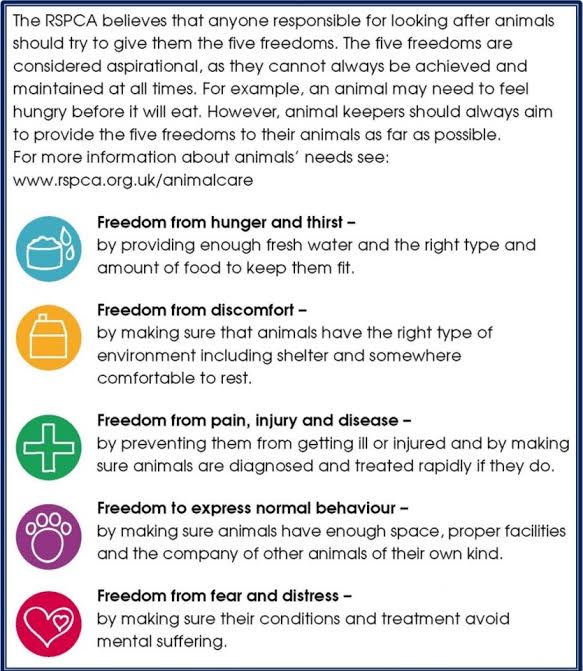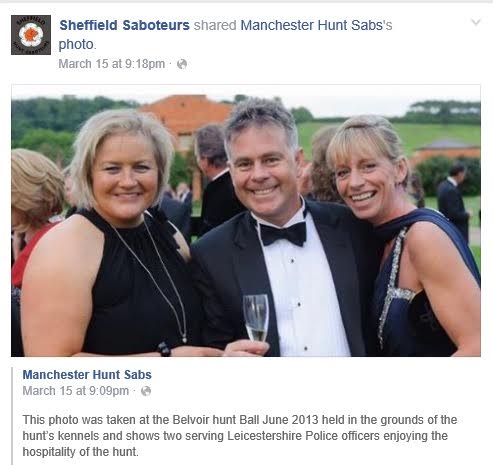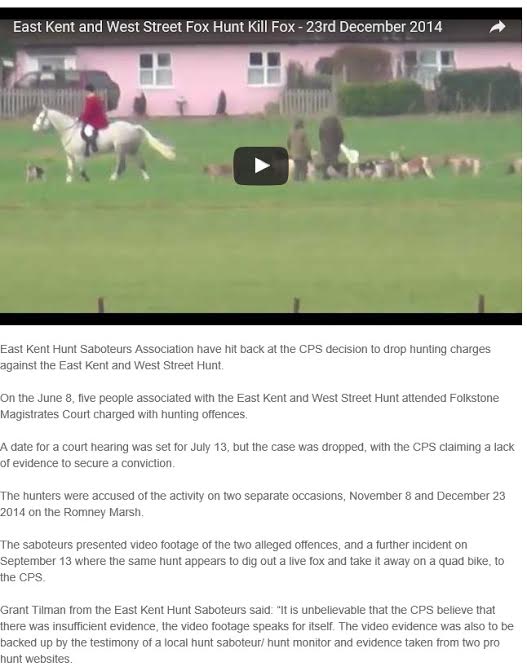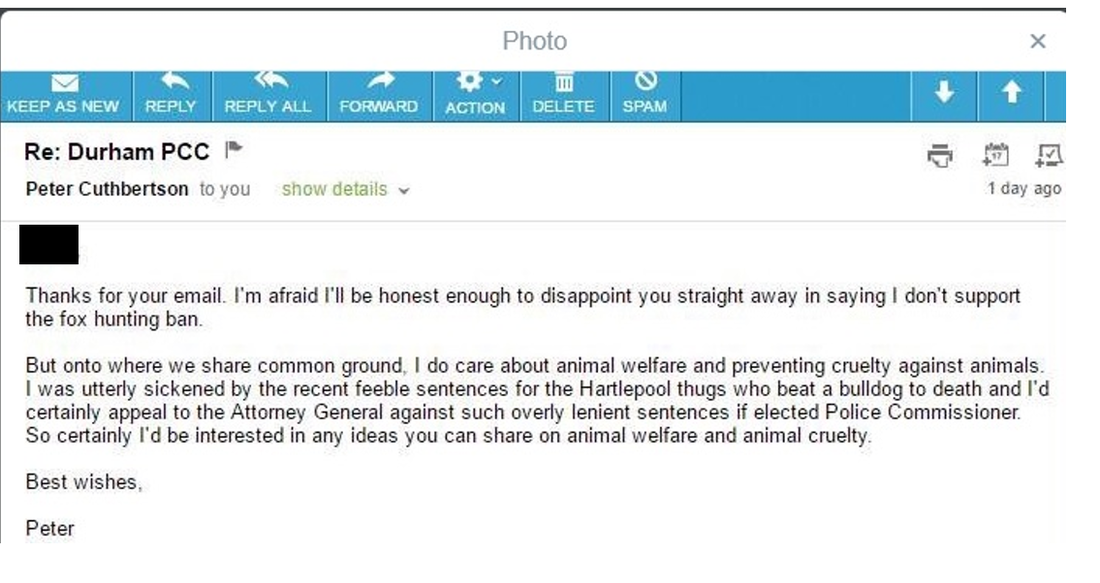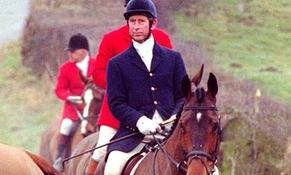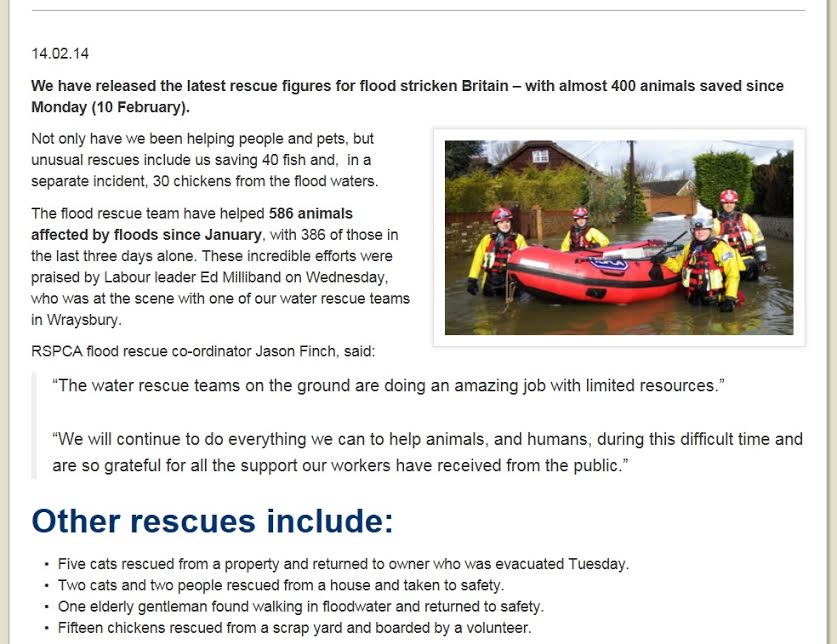 From complaining about RSPCA uniforms copying the police force to pet owners complaining they weren’t allowed to say goodbye to their ‘beloved’ pets, it seems that the RSPCA is constantly being abused in the pro-hunt press. Let’s debunk a few myths surrounding the ‘sinister and nasty’ charges levelled at the RSPCA by those who have fallen foul of UK’s animal protection laws. In 1824 the idea for the RSPCA was conceived in a coffee shop in London. In 1829, five years after the beginning of the RSPCA, Sir Robert Peel, who was Home Secretary at the time, presided over the Metropolitan Police Act which provided permanent appointed Constables who were paid to protect the Capital as part of the Metropolitan Police Force. The early police uniforms were actually not dissimilar to those already worn by the RSPCA, and were chosen because the Peelers wanted to look more like ordinary people. Richard Martin MP (who was also a keen fox hunter) William Wilberforce MP and the Reverend Arthur Broome wanted to do something positive to protect farm animals from cruelty, particularly cattle. Odd that a fox hunter should be so blinkered in his approach that he did not consider the suffering his sport caused to wild animals in the countryside, but whatever Mr Martin’s blind spot might have been, his Bill, which when it became Law, saw the beginning of the RSPCA which has gone from strength to strength in spite of its detractors. Today the RSPCA uniform is still more or less as it ever was, minus the tail coat and top hat. The RSPCA insignia is always clearly and prominently displayed. RSPCA inspectors never act without an owner’s permission unless an animal is suffering or in a dire emergency. If the court feels evidence has been wrongly obtained, it can refuse to admit it. All RSPCA officers carry RSPCA ID cards, and their vans are clearly liveried with the RSPCA logo. “All ranks within the Inspectorate wear a white shirt with obvious RSPCA logo on the left breast. All ranks, except Animal Collection Officers, are provided with a formal uniform for use at special occasions such as Court hearings and ceremonial occasions. During major rescues, specialist teams of Inspectorate staff may opt for a more casual dark blue polo shirt with RSPCA embroidered logo. RSPCA Anyone, even the most myopic amongst us, can see immediately that the RSPCA is in no way trying to emulate the police force, or imbue its inspectorate with special powers above and beyond the rest of us. 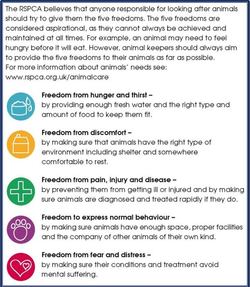 The police and Government Animal Health Officers are the only people who have the powers of entry if animal cruelty is suspected. Usually this happens after a court order is obtained, although there is provision in the Animal Welfare Act (AWA) in emergency situations. The RSPCA inspectorate do not force their way into people’s homes and seize animals, if they did, they would be breaking the law and would be open to prosecution. As we have NEVER seen the RSPCA in court for breaking, entering and stealing animals, I think it’s safe to assume that this is because that is not how the Society carries out its work. The RSPCA relies on the statutory powers of the police with whom they have an excellent working relationship. Similarly, the RSPCA does not keep a band of lawyers on its payroll for prosecuting animal abuse cases. The lawyers used by the RSPCA are independent people who happen to be the best in their field, and well versed in dealing with animal cruelty law. The RSPCA exercises the right that we all have as private citizens to bring private prosecutions against those who neglect or deliberately abuse animals both wild and domestic. In almost all cases of abuse and neglect, concerned neighbours have alerted the RSPCA to the animal suffering, and again in most cases the RSPCA will offer advice and support in the first instance. If the case is escalated because conditions for the animal have not improved, only then is prosecution and seizure of the animal concerned considered. When taking out a private prosecution, the RSPCA follows the same code for public interest as the Crown Prosecution Service (CPS). The Full Code Test has two stages: (i) the evidential stage; followed by (ii) the public interest stage, and if the criteria are not met for those two stages, the RSPCA does not go on to prosecute. We must also remember that the CPS can stop a prosecution at any time if it is thought to be not in the public interest. This has happened in only a handful of cases, and the RSPCA has a much better success rate than the hard pressed and underfunded CPS, which is saving the tax payer millions of pounds a year. No one wants to think an animal has been left to suffer through thoughtlessness or from deliberately inflicted cruelty. The AWA of 2006 puts a duty of care on pet owners today. It is no longer good enough to acquire a pet on a whim and then neglect that pet because the owner either can’t be bothered or forgets to provide clean water or provide proper living conditions, or because they haven’t researched the needs of the animal properly. Neither is it acceptable to neglect an animal because the owner is frail or has special needs. It is a misconception, and one the 2006 Act makes perfectly clear, that to own an animal does not mean someone can treat that creature however they think best without repercussions of one sort or another. The RSPCA is simply doing what it says on the tin, it is standing up for animals, that is putting animals first. To prosecute someone for neglect or abuse is not undertaken lightly. A full team of experts including experienced vets, is mobilised and each individual case is discussed at length, with prosecution being a last resort. Many people are given advice and help and it is only if that advice is ignored and conditions for the animal don’t improve that prosecution is considered. Disability Now magazine, one of the RSPCA’s disgruntled detractors, has criticised the RSPCA, claiming the Charity unfairly targets the elderly and disabled people. Yet there was agreement that the animals in those cases did suffer, and the RSPCA, regardless of the reason for the suffering, has a duty to the animals it exists to protect. RSPCA inspectors receive comprehensive training on the Police and Criminal Evidence Act. If it is deemed necessary to go to court, and if the court has convicted, then there must have been a case to answer. As the only charity who investigates animal cruelty, an RSPCA Inspector’s job is one of a kind. They are on the front line of animal abuse, sometimes dealing with horrific neglect and suffering. The training to become an RSPCA inspector lasts 12 months, it is intense and physical covering all aspects including rescues and cruelty. The RSPCA does a wonderful job, it is a much needed and respected British organisation at the forefront in the fight against animal cruelty in the UK. If you care about animals consider joining the RSPCA and be part of that force for goo
0 Comments
 Op-ed: Members of the Environment, Food and Rural Affairs committee (EFRA) are currently in discussion about Britain’s animal welfare laws and whether they are still fit for purpose in 2016. The inquiry will focus on the effectiveness of the Animal Welfare Act 2006 in protecting domestic pets, such as cats, dogs and horses, from cruelty. This is in part response to the growing concern about Internet trade in animals and the easy way unscrupulous people can buy and sell animals for dog fighting, baiting and other nefarious activities. Included in EFRA’s review of animal laws is a debate about the RSPCA and whether the charity should be allowed to continue in its present form of investigator and prosecutor. The RSPCA has been saving animals both domestic and wild for 200 years. It is irreplaceable and the work could not be picked up by the police and the CPS. The Charity has no statutory powers above and beyond any citizen in the UK. It is a long established legal right of every one under English law to bring a private prosecution, and with a 92.4 per cent success rate, which is much higher than the CPS, the RSPCA has saved the taxpayer £43 million a year, and in 2015, 796 animal abusers out of 1,781 were convicted and punished. So all in all the RSPCA is fulfilling its remit as a charity by preventing cruelty and helping bring animal abusers to court in the interests of the public. It should also be remembered that the RSPCA has no powers of arrest, and in the case of domestic animal abuse, all arrests and removal of animals are carried out by the police, not the RSPCA. Similarly, in Court it is the lawyers and the judges who decide if a person is guilty or innocent, not the RSPCA. No reasonable person would argue that RSPCA private prosecutions are anything but about stopping animal abusers and saving animals from suffering but it appears the Charity is a victim of its own success. Animal experts and others in authority have been invited to submit evidence for the EFRA review, and the National Police Chiefs Council (NPCC) has reportedly also submitted evidence to EFRA stating that the RSPCA should step back and leave the roles of investigator and prosecutor exclusively to the police and the CPS. The NPCC is concerned that the RSPCA has no statutory powers to assume the default role of investigator and prosecutor and it draws attention to the fact that the RSPCA has been shouldering this responsibility outside of a statutory framework for some considerable time. The NPCC goes on to say that groups such as the Countryside Alliance (CA) have long accused the RSPCA of pursuing politically motivated prosecutions against hunters and it is past time the Charity left the state to prosecute criminals as it does in every other area of the law. Tim Bonner, CA CEO said, “The time has come for the society to accept that none of its prosecution decisions will be seen as independent whilst it attempts to carry out the multiple roles of political campaigning and criminal prosecutor, whilst running an intensive fundraising operation," Tiverton and Honiton MP and Efra committee chairman Neil Parish said the role of the RSPCA is, "certainly something MPs will be looking at and taking evidence on. We are a nation of animal lovers and that's why the RSPCA is one of the largest and most well-funded charities in our country. They've had a tough period and I think that prosecutions have had a lot to do with that.” Rebecca Pow, MP for Taunton Dene, who is also a member of EFRA, said animal welfare is one of the issues constituents contact her about the most and whilst this Government has made huge strides in this area, including taking action on protecting wildlife, there is still much work left to do. Ms Pow hopes the EFRA inquiries can highlight the areas where improvements can be made. And so the stitch up of the RSPCA begins in the guise of updating the UK’s animal welfare laws. If we take a closer look at the EFRA committee, half of those on board are pro hunt and pro repeal of the hunting Act. Neil Parrish, EFRA Chair, is rabidly pro hunt and pro badger cull. Rebecca Pow, MP is also in favour of making legal again the ripping up of Britain’s wildlife for entertainment. Neither Mr Bonner nor the NPCC have explained in what way prosecuting animal abusers is political. It’s not and never has been political to stop people being cruel. Neil Parrish claims the RSPCA prosecutions have made it tough for the Charity. He’s right, but not because of any political motivation. The Countryside Alliance has long had reason to hate the RSPCA since the Charity successfully prosecuted the Heythrop hunt for illegally killing a fox. The unelected, single issue, pro hunting/shooting Countryside Alliance organisation has relentlessly pursued the RSPCA through the pro hunting media with lies and smears and claims that prosecuting hunt abuse of wild animals is because people are against toffs enjoying themselves. There is no moral argument to support hunting, so the next line of attack is to render those against their cruel form of entertainment powerless. What better way to avoid prosecution than to remove the right of the RSPCA to prosecute? To this end, the Countryside Alliance has harassed the RSPCA online and in the national press. The CEO has pestered the Charity Commission, members of Parliament and indeed anyone else who will listen to the relentless carping. This remorseless attack is not in the best interest of animals, it is purely in the interests of the hunting fraternity, who want the RSPCA stripped of its right to investigate and prosecute hunt abuse of wild life. The police aren’t interested in illegal hunting, and indeed many police officers are pro hunt themselves, so with the RSPCA unable to act, its business as usual for hunts up and down the country with little fear of being caught and punished. Many reports of police collusion with hunters and the prevention of the saboteurs monitoring hunts can be found on Facebook. On March 20th this year, the Sheffield saboteurs reported that an inspector based at a Northampton police station, encouraged hunt followers to block the road preventing the sabs from following the hunt for 10 minutes, giving them time to get a head start. It was alleged that the same officer also witnessed an assault on the sabs but then claimed he didn’t. When challenged he said " I am not bothered about assaults. But I am bothered about aggravated trespass " In answer to the question, are you going to do anything about illegal hunting? he said "no, but I will be making arrests for aggravated trespass “. The Accidental Activist wrote in his blog in March that a senior police inspector was present at an illegal cub hunt in 2015, and the Wild Life Crime Officer for Leicestershire police was forced to stand down from her role when it was discovered that she is from a hunting family and she is currently involved with the Duke of Rutland’s Belvoir hunt. (The same hunt that is under investigation after allegations of grievous bodily harm to two monitors from the League Against Cruel Sports.) It has been alleged that on other occasions Leicestershire police regularly harass hunt sabs while ignoring assaults, dangerous driving and reckless & outrageous behavior by local hunt supporters. Leicestershire police are not alone in this. In 2006 Avon and Somerset and Devon and Cornwall police were presented with evidence against the Exmoor Foxhounds but they decided not to pass the file on to the Crown Prosecution Service. The police prevaricated until such time as the League was forced to take out its own private prosecution against the hunt. Elections for Police and Crime Commissioners will be held in the 41 police force areas of England and Wales on 5 May 2016. One of the candidates for Durham is Tory Peter Cuthbertson who has declared in an email to a constituent that although he is very much against animal abuse and supports good animal welfare he does not support the fox hunting ban. Lord Ashcroft, in his unofficial biography of David Cameron, claimed that whilst our Prime Minister was an MP, he wrote to the CPS to get a friend off a hunting charge. The CPS subsequently dropped the case and a FOI request about the issue was denied on the grounds it was not in the public interest. David Cameron is himself a hunter, and repeal of the hunting Act is in the Tory manifesto. As recently as June 2015 East Kent Hunt Saboteurs Association presented the CPS with evidence of illegal hunting but the case was dropped before the Court hearing on July 13th. The hunters were accused of illegal hunting on two separate occasions, November 8 and December 23 2014 on the Romney Marsh, and a separate incident when they were alleged to have dug out a live fox. Video evidence was supplied as well as an expert witness statement. Grant Tilman from the East Kent Hunt Saboteurs said: “It is unbelievable that the CPS believe that there was insufficient evidence, the video footage speaks for itself. The video evidence was also to be backed up by the testimony of a local hunt saboteur/ hunt monitor and evidence taken from two pro hunt websites.” In disgust Mr Tilman went on to say, “How often does a prosecution case have video evidence of an offence, someone with twenty two years of hunt experience ready to testify, not to mention two websites implicating many of the accused at the scene of the crime. How much evidence do they need? A signed confession?” So where does all this leave animals if the RSPCA is stripped of its prosecuting rights? And equally worrying, where will it end? Will the League against Cruel Sports be banned too from taking abusers of UK wild animals to Court? People who care about animals are justifiably concerned that with animal cruelty on the rise, and prosecutions left to the police and the CPS, many animals both domestic and wild will not get the protection or the justice they deserve. Many of us feel that the EFRA committee would serve our animals better if instead of persecuting the RSPCA, they remind Britain’s police forces that they have a duty to uphold ALL UK laws, not just those they deem are more important. September 2015 - Open letter to EFRA, Cameron, Hart and Parish Resources: Daily Mirror https://www.facebook.com/sheffieldsaboteurs https://morethanjustbadgers.net/2016/03/ 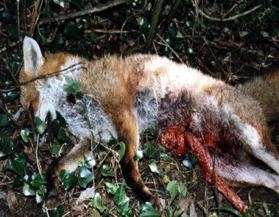 (He was however reprimanded for his imprudence at a later date). Unfortunately for Mr Barnfield et al, the evidence of blatant hunting was irrefutable, and they had no option but to ‘fess up, and Justice Tim Pattinson had no other option but to bring in a verdict of guilty. He fined the Heythrop hunt and its members £6,800, but then he rounded on the RSPCA for spending £330,000 to bring the case. “Members of the public may feel that RSPCA funds can be more usefully employed,” he told Oxford Magistrates' Court. Perhaps he’d not heard that the Spindles Farm prosecution, brought against farmer Grey for cruelty to his horses, cost three times that amount and the RSPCA was praised on that occasion for their professionalism and diligence. Obviously Prince Charles feels the same. He wants the RSPCA to spend its time on other cruelties, the likes of which won’t affect his hunting chums. The police don’t seem to bother, and the CPS are not in a good place right now with funding cuts and no real experts to take on hunting cases. If only the RSPCA would just concentrate on more working class sadisms, like lamping and dog fighting, fox hunters could then carry on Tally Ho Ho Ho-ing and hollering all over England’s green and pleasant land with no hindrance to their enjoyment. The disembowelling of our precious wildlife for the sheer entertainment value of it all would go on as before with little fear of prosecution. Of course the Countryside Alliance (CA) is cock a hoop with his Royal Huntness. That bastion of all that is wrong and bloody in the UK countryside thinks it’s a great idea for Charlie to threaten the RSPCA with dissociation from all things Royal. The CA CEO, Tim Bonner, had this to say, "Anyone considering taking on the patronage of the RSPCA would have to consider its future direction and whether it is going to continue down a radical campaign path. If it reverts to its traditional role as a welfare charity protecting animals I am sure nobody could have any reason not to support its work." In all honesty, would it be so bad if the RSPCA dropped the ‘R’? RSPCA supporters think not. In fact many people have been unhappy for some time that the bloodthirsty in the highest circles continue to support killing wild animals.  Prince Charles’ grandsons and his daughter in law, with attendant family, celebrated Kate Middleton’s thirty fourth birthday ‘low key’ blasting away at birds in the seclusion of a private estate. Charles’ sister, the Princess Royal, was a one-time patron of the RSPCA until it was deemed unfit for someone so rabidly pro hunt to front a charity which was founded to promote kindness to animals. The upper echelons have tried for some time to get their bloodstained paws on the RSPCA. In 2001 the RSPCA expelled the Olympic showjumper Richard Meade for orchestrating a campaign to infiltrate the society and overturn its longstanding opposition to hunting. Fortunately the RSPCA has resisted all efforts at take over and has stood firm on its policies against hunting. This ethical and moral stance has not been an easy ride. The Charity’s last CEO was bullied mercilessly for daring to take the rich man’s sport to task. Lies and smears in the pro hunting press, together with continuous bad mouthing from the Country side Alliance, forced Mr Grant to retire on health grounds. At present the Charity is without a new chief executive; a job, in the light of the bile and spite pouring forth from the hunting fraternity, is not one any prospective candidate would take on lightly. In a way, Price Charles is right. The RSPCA will do very well without pro blood sport Royal Patronage. 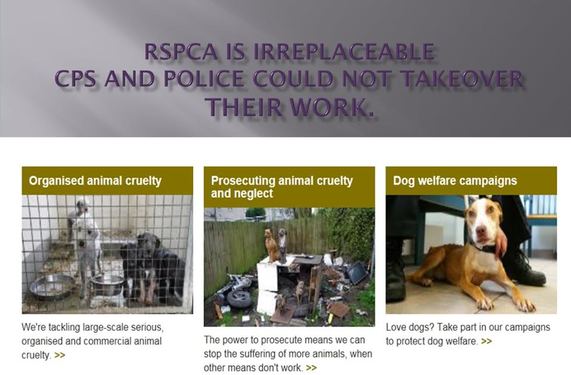 The RSPCA are irreplaceable The RSPCA are irreplaceable An open letter to EFRA, Mr David Cameron, Simon Hart MP and Mr Neil Parish MP A great many of us are seriously concerned that the EFRA [Environment, Food and Rural Affairs] committee is using its position in government to curtail or remove the right of the RSPCA [Royal Society for the Prevention of Cruelty to Animals] to investigate and prosecute animal cruelty cases, and that the motive for this move is more about preventing fox hunting prosecutions than any real concern for animal welfare.
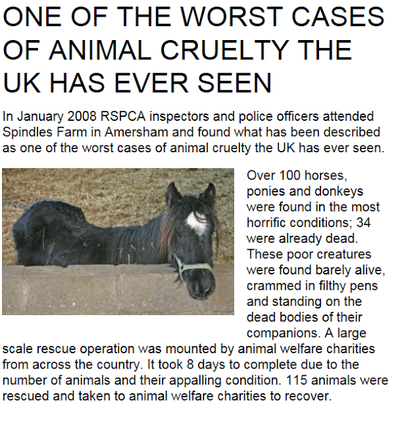 Spindles Farm Amersham Spindles Farm Amersham It will be impossible to prosecute if the Charity is not allowed to investigate, and it will be difficult to investigate if the Charity then has to rely on the CPS to bring up the thousands of cases in Court. It should also be remembered that it is the right of every private citizen to seek justice through the UK Courts. Of course there will be times when the RSPCA gets it wrong, but in the thousands of abuse cases which reach Court, there is only a handful which have been stopped and deemed not to be in the public interest. I would point out that for every case which does go to court, there are hundreds more that don’t. The problems are sorted out with RSPCA support and education and the cooperation of the animal’s owner. Sometimes the animal’s owner is reluctant or refuses to improve or take advice and that is when the RSPCA must step in for the sake of the animal. The Charity spends around 5p in the £1 on prosecutions and the rest of the money is spent on animal housing, veterinary treatment, education and of course paying inspectors salaries. The RSPCA also saves the taxpayer hundreds of thousands of pounds every year which it is doubtful could be matched by the CPS, especially in these times of austerity and swinging cuts to services. The pro hunting press, ably abetted by the Countryside Alliance, are also guilty of a steady build-up of accusations of RSPCA misuse of power. The Telegraph and the Daily Mail are particularly aggressive in accusing the RSPCA of radical campaigning, promiscuous legal actions and the underhand use of funds. Yet this is at odds with ALL of the RSPCA reviews which have found the RSPCA to be acting within its remit, which is to prevent animal abuse. The Charity Commission has said on at least two occasions that the RSPCA has no case to answer. The Heythrop prosecution is often cited by Mr Hart as a scandalous waste of money, which he claims was undertaken for political motives to embarrass the Prime Minister who has associations with the hunt. But it has never been political to uphold the law, nor is it political to prosecute cruelty. Perhaps if the Heythrop themselves had been more mindful of Mr Cameron’s reputation by association, they would have not broken the law in the first place. (Oddly the Charity’s prosecution of cruelty to horses in 2008 on Spindles Farm cost over £2,000,000, and the RSPCA was praised for their dedication and compassion.) It is of especial concern that animals will not get the protection they need after reading Lord Ashcroft’s expose of David Cameron, who he claims, when in opposition, used his influence and asked the CPS to drop a hunting case against a member of the Heythrop hunt, and if that allegation turns out to be true, not only was Mr Cameron’s action undemocratic, but it could also be viewed as an attempt to pervert the course of justice. The CPS dropped the case against the hunter, which in the light of recent news reports of Mr Cameron's personal intervention does not give people confident in the CPS or the law. The RSPCA is as respected and it is respectable, it is also unique. Britain has a reputation of being a nation of animal lovers and the majority who care do not want to see the RSPCA rendered useless because another backdoor attempt is being made to prevent hunt prosecutions. If the EFRA committee rule that the RSPCA can no longer investigate and prosecute animal abuse, then perhaps EFRA would tell us what it intends to put in place of the Charity, and where the money will be found to carry out the investigations and to fund the court costs so that no animal is left to suffer. Sources and resources; Politics Youtube Wikipedia Western Daily press |
Animal mattersCountry lover, amateur naturalist and fox lover fighting to preserve the ban on hunting Archives
September 2016
Categories
All
|


